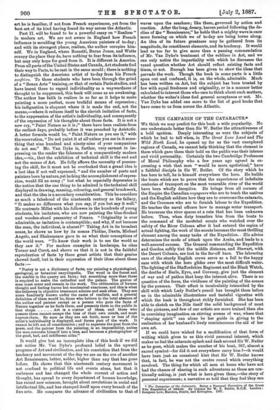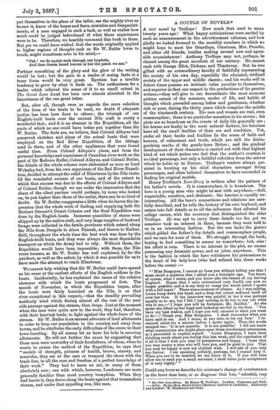THE CAMPAIGN OF THE CATARACTS.*
WE think we may predict for this book a wide popularity. No one understands better than Sir W. Butler the attractiveness of a bold egotism. Deeply interesting as were the subjects of which he had to tell when, in The Great Lone Land and The Wild North Land, he opened up for us the vast unexplored regions of Canada, we cannot help thinking that the element in them which gave them their hold on the public was their intense and vivid personality. Certainly the two Cambridge Professors of Moral Philosophy who a few years ago agreed in ex- pressing a wish that men "would be more egotistical," have a faithful disciple in Sir W. Butler. Of the story which be has here to tell, he is himself everywhere the hero. He builds the boats which are to prove that the experiences of indefinite centuries of transport on the most venerable river of the world have been wholly deceptive. He brings from all corners of the Empire the Canadian voyageurs who are to teach the natives and the English soldiers how they are to overcome the cataracts, and the Croomen who are to famish labour to the Expedition. He teaches the naval officers how to manage water transport. He traverses the river spaces at a rate that has been unknown before. Then, when duty transfers him from the boats to the command of the mounted scouts who watched over the safety of the River Column after it had entered the region of actual fighting, the work of the scouts becomes the most thrilling element among the many tasks of the Expedition. - His advice determines the mode of attack upon the Arabs, and leads to a well-assured success. The General commanding the Expedition and Gordon softly tint the middle distance, and Stewart, with the Desert Column, are lost in the far-off haze. The labouring oars of the sturdy English crews serve as a foil to the happy ease with which the hero glides over the most difficult water. The fighting of the Staffordshire Regiment and the Black Watch, the deaths of Earle, Eyre, and Coveney, give just the element of war and of pathos that keep the interest alive. There is no question of the force, the vividness of the painting of the scenes by the penman. Their effect is incalculably intensified by the skill with which Lady Butler's pencil has brought them before us in the admirable illustrations and tasteful vignettes with which the book is throughout richly furnished. She has been able to sketch on the Nile itself the solid background of most of the pictures, and few of our artists are more trained than she in exercising imagination on stirring scenes of war, where that "shaping spirit" can alone be her guide in giving to the realisation of her husband's lively reminiscences the aid of her own art.
If we could have wished for a modification of that form of writing which gives to us this vivid personal interest, which makes us feel the cataracts splash and dash around Sir W. Butler as he goes, which makes the number of his boat, 387, almost a sacred symbol—for did it not everywhere carry him P—it would have been just an occasional hint that Sir W. Butler knows that, in fact, he was not the centre round which everything revolved. The thing for which all men at home who have not had the chance of sharing in such adventures as these are con- tinually asking, is just what is here given them,—the story of personal experiences; a narrative so told that they feel they can
• The Campaign of the Cataracts. Being a Personal Narrative of the Great Nile Expedition of 1E8485. By Colonel Sir W. F. Butler, H.O.B. London Sampson Low, Marston, Searle. and Riviagtoa. 1887.
put themselves in the place of the teller, see the mighty river as he saw it, know of the hopes and fears, anxieties and disappoint. ments, of a man engaged in such a task, as well as realise how much could be judged beforehand of what those experiences were to be. Therefore, we heartily commend this book to them. But yet we could have wished that the words originally applied to higher regions of thought such as Sir W. Butler loves to touch, might sometimes echo in his mind,—
" Fah ! we do squint each through our loophole, And then dream broad heaven is but the patch we see."
Perhaps something of the glory and the glow of the writing would be lost ; but the gain to a reader of seeing facts in a truer focus would be very great. Egotism has a terrible tendency to grow by what it feeds on. The enthusiasm for a leader which relieved the sense of it to no small extent in The Great Lone Land has been now almost absorbed in the importance of the one great letter.
But, after all, though even as regards the mere selection of the form of the boats to be used, we doubt if adequate justice has been here done to others ; the triumph of our English-built boats over the ancient Nile craft is surely a wonderful fact; and it is an element in the Expedition, all the parts of which no one could have better put together than Sir W. Butler. The facts are, we believe, that Colonel .Alleyne had preserved sketches and plans of the actual boats that were employed on the Red River Expedition, of the fittings used in them, and of the other appliances that were found useful then. From Colonel Alleyne's plane, and from the personal knowledge and experience of Canadian river work on the part of Sir Redvers Buller, Colonel Alleyne, and Colonel Butler, the details of the whole scheme were elaborated as soon as Lord Wolseley had, from his own experience of the Red River Expedi- tion, decided to attempt the relief of Khartoum by the Nile route. Of the wonderful success of our boats, and of the extent to which that success was due to the efforts of Colonel Alleyne and of Colonel Butler, though we are under the impression that the share of the silent partner would perhaps, by some who looked on, be put higher than those of the scribe, there can be no kind of doubt. Sir W. Butler exaggerates a little when he leaves the im- pression that the whole work of feeding and supplying both Sir Herbert Stewart's Desert Column and the Boat Expedition was done by the English boats. Immense quantities of stores were shipped up by the native craft, and very large supplies of food and forage were collected in the fertile provinces which extend along the Nile from Dongola to Abet; Fatmeh, and thence to Kaibur. Still, throughout the whole time the best work was done by the English-built boats, and they were always the moat dependable transport on which the Army had to rely. Without them, the Expedition would have been impossible; with them, the Nile route became, as Sir W. Butler has well explained, by far the quickest, as well as the safest, by which it was possible for ns to have made the attempt to reach Khartoum.
We cannot help wishing that Sir W. Butler could have spared us his sneer at the earliest efforts of the English soldiers in the boats. Incidentally, he has explained the cause of the relative slowness with which the boats progressed at first. The month of November, in which the Expedition began, after the boats were fairly launched on the Nile, is on that river exceptional in this respeck—that the steadily prevailing northerly wind which during almost all the rest of the year aids passage against the stream, then drops. Just at the moment when the men were quite new to the work, they had, therefore, with their heaviest loads, to fight against the whole force of the stream. Sir W. Butler is an earnest advocate of land allotments in order to keep our population in the country and away from towns, and he attributes the early difficulties of the crews to their town-breeding. By all means let us have his help in securing allotments. He will not further the cause by suggesting that those men were unworthy of their forefathers, of whom, when he wants to praise the method of the Expedition, he says that "models of strength, pictures of health, brown, sinewy, and muscular, they sat at the oars or tramped the shore with the track-line, in all the ease and freedom of a perfect knowledge of their work." They had to learn an art, to many of them absolutely new; one with which, however, Londoners are more generally familiar than most country bumpkins. When they had learnt it, they drove along the boats against that tremendous stream, and under that appalling sun, like men.



































 Previous page
Previous page